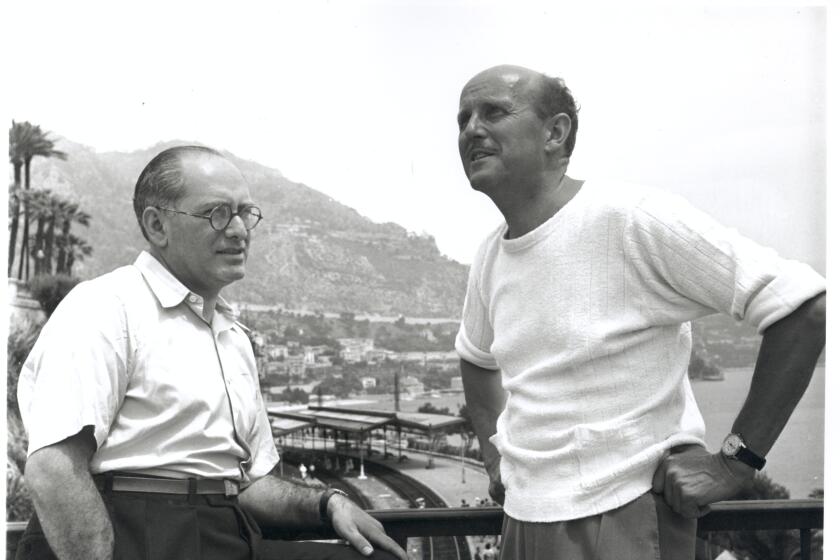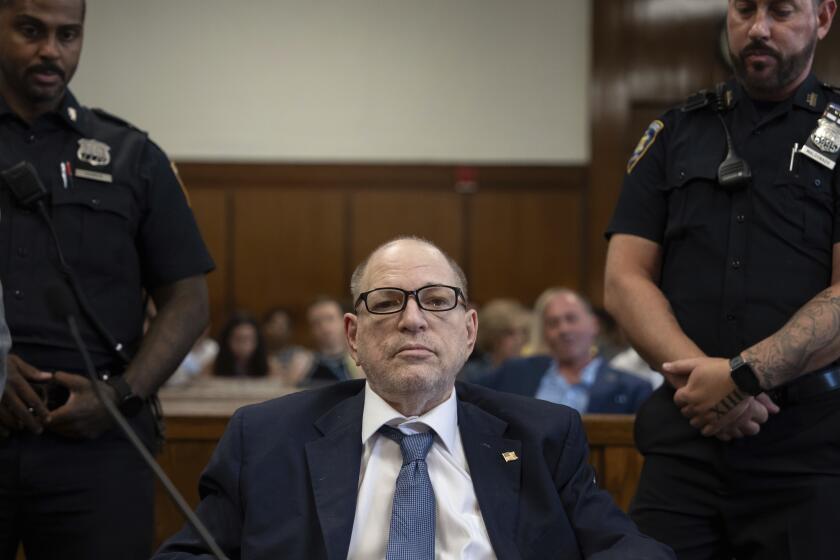The Wonders of the City Before the Dawn’s Early Light
My wife and I have received a postcard from our friend Ray Bradbury, who is vacationing with his wife, Maggie, in Paris.
Of course we are delighted to hear from that incurable romantic, and to have something of Bradbury’s written for our eyes only is especially gratifying.
As a professional writer, Bradbury probably does not like seeing his work published without his permission, much less without pay. However, his subject is one of universal interest, and I hope he will forgive me.
His message is on the back of a colored photograph of him and Italian director Federico Fellini. They sit in a booth, arms locked, smiling bibulously.
He writes:
“Dear Denny and Jack: Well, here we are, the Dixie Duo. Fellini and Bradbury in Roma two weeks ago, where we picked up on our old friendship, last tested 13 years ago. . . .
“While there I did a thing we often forget to do. Looking out at the city at 5 in the morning and seeing a lone taxi down in front of my hotel, I said, ‘Hell, why not?’ And dressed and ran down to take the cab to St. Peter’s Square at 5:30 a.m., as the sun was rising over a quiet city.
“I had St. Peter’s Square entirely to myself as the sun rose, coloring the marble facades pink. I stood by the obelisk in the silence and thought, ‘Why didn’t I do this before? Here, in other towns, other places?’
“To own all the sky and the pavements and the buildings, one person in the midst of beauty. We complain of crowds but never get up in the dark to go out for serenity and quiet joy. Paris at 6 on a misty morning is superb. And how nice Times Square must be at 6 a.m. Safe! I would imagine. Safe! Much love to you both. Maggie joins me in this.”
It is strange, as Bradbury says, that so few of us get up to see the Earth at dawn, when it is at its loveliest. Even the grimy city is bathed in the golden light of the rising sun. Fireplugs and fenders and fences are touched by dew. The streets are almost empty. Sounds are separate from one another, like those of a symphony tuning up. The baton has yet to rise.
Some years ago I flew to Washington with a group of colleagues for a National Press Club ceremony honoring our editor, Nick Williams. We stayed only overnight, and were to fly home the next morning. At 6 a.m. I caught a taxi and went to the Lincoln Memorial.
The driver waited while I climbed the steps to that marble temple in which a reflective Abraham Lincoln sits in his chair for all time. The only other person in sight was a guard. I looked out across the long reflecting pool, shimmering in the early light, and beyond it to the sun-gilded dome of the Capitol.
Engraved in marble on an inner wall was Lincoln’s Second Inaugural Address. I read the eloquent final words:
“With malice toward none, with charity for all, with firmness in the right as God gives us to see the right, let us strive on to finish the work we are in, to bind up the nation’s wounds, to care for him who shall have borne the battle and for his widow and his orphan, to do all which may achieve and cherish a just and a lasting peace among ourselves and with all nations.”
I looked out over the sleeping citadel, the fortress of democracy. It seemed deceivingly at rest and tranquil. I am not given to surges of patriotism, but I felt that everything would be all right.
I took a cab back to the Dolly Madison and found my colleagues just coming down to breakfast and the Washington Post. They had missed my transcendental experience.
Yes, even Times Square might seem safe and lovely if only we could see it at dawn. But how many tourists does one see out at that hour? They are on vacation, after all; they are entitled to sleep in.
I once saw the Parthenon in the early morning. It was not dawn, but it was too early for the crowds. It was in 1958, on the eve of the jet boom. Tourists were not then swarming over every monument in the world, as they do today. Except for a couple of locals, I was alone.
Jet travel has destroyed aloneness. Every historic site in the world is overrun by tourists swarming in on buses. Few places remain off the beaten path.
Perhaps I shouldn’t be spoiling Bradbury’s secret by writing this. But buses aren’t likely to start pulling up in front of the Great Pyramid at dawn. It’s too hard to get us out of bed.
More to Read
Only good movies
Get the Indie Focus newsletter, Mark Olsen's weekly guide to the world of cinema.
You may occasionally receive promotional content from the Los Angeles Times.






